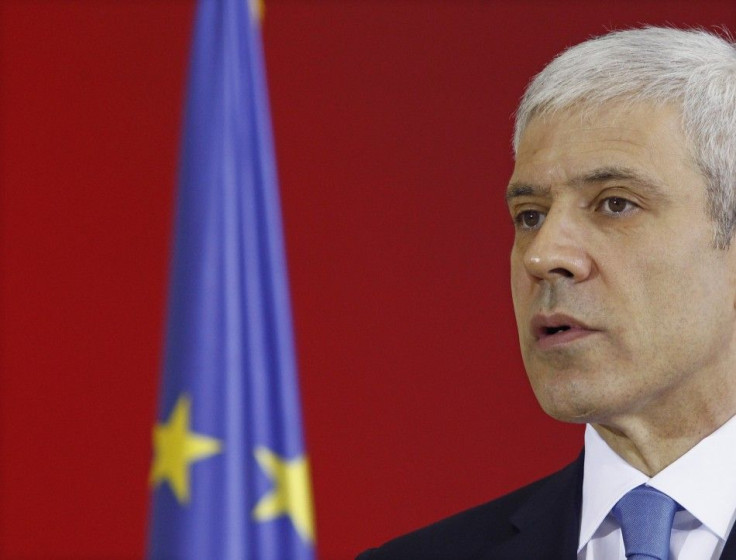Serbia: Tadic Resignation Could Jeopardize Bid To Join EU

Serbia's President Boris Tadic said Wednesday that he'll step down 10 months before the end of his second term in an effort to increase his party's chances of retaking control of the government.
Tadic, who has served as president since 2004, will submit his resignation letter Thursday, handing the government to the speaker of parliament, Slavica Djukic-Dejanovic, whose Socialist Party is a member of Tadic's ruling coalition.
By resigning, Tadic has made himself eligible for an emergency presidential election to be held within 60 days. It also gives him the chance to campaign during a crucial time. His Democratic Party is losing favor due to the sluggish Serbian economy. The presidential vote is expected to be held May 6, the same day as previously scheduled parliamentary and local elections.
Tadic's resignation also provides an opening for opposition leader Tomislav Nikolic, the pro-Russia candidate with the best chance of defeating the outgoing incumbent. Tadic and Nikolic clash on a number of issues, including their views on Slobodan Milosevic, the indicted war criminal who died in 2006.
But the most important of their differences is over is Serbia's potential accession to the European Union. The former Yugoslav republic became an EU candidate thanks in part to Tadic's aggressive roundup of remaining fugitives, including Milosevic, from the 1990s Bosnian war, but Nikolic would rather become Russia's stronghold in Europe than an EU state.
Nikolic, who was beaten by Tadic in the 2004 and 2008 presidential elections, was once the head of the anti-EU Serbian Radical Party but left in 2008 to form the Serb Progressive Party, or SNS. Nikolic's new party seeks to serve as a bridge between East and West, but he still prefers the leadership of Russia's Vladimir Putin over that of his compatriot Tadic or the EU.
“On one hand I advocate Serbia’s membership in the EU but at the same time I as a politician intend to do everything in order to develop relations with Russia. We want a reconstruction of the state in the legal area in accordance with the EU standards. Simultaneously, I am convinced of a necessity to deepen the contacts with Russia,” Nikolic told Serbian news outlet B92 in March.
“Serbs are connected to Russia with their religion, history and culture and in the most difficult moments we turn to Moscow, he said.
Serbia is currently suffering economically, with Its currency, the dinar, losing value against the euro and unemployment rising. While both presidential candidates will run on platforms of economic reform and job creation, for Nikolic this means construction of the South Stream natural gas pipeline led by Russian gas monopoly Gazprom. The project would deepen Serbia's ties to and reliance on Russia for energy and, potentially, minimize the role of the EU, according to OilPrice.com.
Another important difference between Tadic and Nikolic is over Kosovo; resolution of the status of the one-time breakaway republic is a condition of Serbia's EU accession. While neither candidate will recognize Kosovo's declared independence -- as some countries have -- Tadic said he would be willing to let Kosovo take part in international meetings. His nationalist opponents blame Tadic's policies for the decision by Kosovo to unilaterally declare independence in 2008.
Asking Serbs to choose between the EU and Kosovo is like asking someone to choose between killing a daughter or a son, Nikolic once told the New York Times.
In February, he said his government's desire to reach a deal acceptable to both Serbs and Kosovars is dangerous because it could mean rewriting the Serbian Constitution. While the SNS has long opposed independence for Kosovo, even suggesting the use of military force to preserve the status of what Serbia considers its southernmost province, Nikolic himself has abandoned that stance.
“We have a very strong request: If a condition for the EU is renouncing of Kosovo, we will stop all negotiations immediately,” Nikolic told Russia's Izvestia newspaper in March. “I want to point out one more time that we want to be a new EU member but without joining NATO and without giving up on Kosovo.
© Copyright IBTimes 2025. All rights reserved.





















